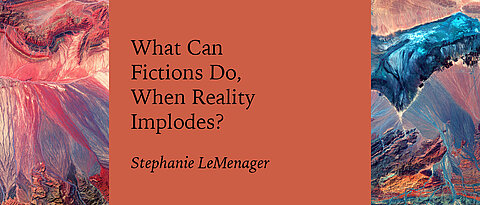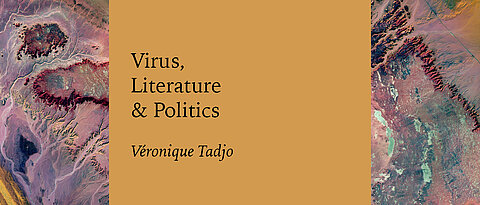
This is an online event that will take place in English. Please register via eh@uni-wuerzburg.de to receive the Zoom link.
moreHere you will find information about events in the Environmental Humanities. Recordings and reading lists from past events can be found among our resources.

This is an online event that will take place in English. Please register via eh@uni-wuerzburg.de to receive the Zoom link.
more
The talk will be a hybrid event, conducted in English. Please RSVP if you are able to attend by emailing eh@uni-wuerzburg.de and specifying how (in person or via Zoom) you would like to attend.
more
The talk will be an in-person event, available to students only. Please RSVP if you are able to attend by emailing eh@uni-wuerzburg.de.
more
Music, spirituality and ritual all play powerful roles when it comes to the way we see and experience the spaces and beings around us. This presentation draws on three years of interviews and fieldwork to look at the ways in which a range of different Christian groups have been prompted to moments of musical creativity in response to global crisis.
more
The talk will be an in-person event, conducted in German. Please RSVP if you are able to attend by emailing eh@uni-wuerzburg.de.
more
In philosophy and politics, there is a strong emphasis on speaking at the cost of listening, and language at the cost of silence. Speaking and language are in the western tradition furthermore seen as human capacities, and denied to other animals, plants and nature, effectively silencing them in our knowledge systems and political realities. Many of the ecological problems all beings are currently facing are connected to anthropocentrism, as a world view that disconnects humans from the rest of the living world, and as a mode of being in which humans use others for their own profit. Challenging anthropocentrism asks for developing a new attitude as humans. We cannot do this alone: we need to learn to engage differently with the other living beings with whom we share the planet, and centre their perspectives in working towards a different future. First and foremost for their sake, but also for ours. Finding out more about their perspectives asks for rethinking language and speaking in a multispecies context, for attending to their silences, and thus for listening. In my talk I will discuss political listening within and between multispecies communities, drawing on insights from ethology, multispecies ethnography and political animal philosophy. I will also explore political listening to new voices, using Pauline Oliveros’ concept deep listening as a starting point.
more
We are very pleased to celebrate the publication of the edited volume Climate Changes Global Perspectives (WUP 2022) with an official book launch event on April 26, 6:30-8:00 pm (CET). The volume brings together creative approaches to representing environmental crises in a globalized world, which originated in an eponymous symposium hosted virtually by the University of Würzburg in August of 2021.
moreFrom March 2-3, 2023, the Environmental Humanities class of the Graduate School of the Humanities (GSH) will meet at the Botanical Garden of the University of Würzburg. Members of the EH class and collaborators from institutions beyond Würzburg will divide the time between discussions of ongoing research projects and generative material engagements. If you are interested in joining the conversation, please get in touch by emailing eh@uni-wuerzburg.de.
more
As part of the opening event of the BMBF joint project REKLINEU – "Regional Pathways to Climate Neutral Universities" – the public evening lecture by Prof. Dr. Matthias Drösler from Weihenstephan-Triesdorf University of Applied Sciences will take place on December 14, 2022, 6:15 pm. The topic of the lecture is climate protection through peatland conservation. The basic characteristic of peatlands is the storage of carbon through the build-up of organic matter as a result of incomplete decomposition under naturally water-saturated conditions. This process has been ongoing in Europe since the last ice age and has resulted in peatlands being the largest terrestrial carbon stores per unit area. For the climate relevance of peatlands, however, it is not primarily the C-pool but the balance of the exchange of climate-relevant trace gases that is decisive. In a near-natural state, peatlands are +/- climate neutral, since the uptake of CO2 and the release of CH4 compensate each other with respect to the global warming potential. However, only about 5% of the peatlands in Bavaria are still in near-natural condition. Most of them are drained and used for agriculture or forestry. As a result, the moor soil is aerated, aerobic degradation begins and the moors develop into hotspots of climate pollution.
The lecture will explain the basics of the climate relevance of peatlands, present the current balances for Bavaria and outline the options for action to achieve climate protection goals: The challenge of using peatlands as CO2 sinks will be considered on a technical organizational and strategic/legal level.
more
Literature and Climate (Change): How does literature, especially poetry, participate in the debate about the climate crisis? And what can we learn from ecopoetry? We will present and discuss examples from the work of the American poet Jorie Graham.
Please register via eh@uni-wuerzburg.de. The Zoom link will be sent to you after registration.
This event is part of the Public Climate School 2022 and therefore open to the public. Further information: https://publicclimateschool.de/lokalprogramm-nov-22/
Find further PCS events in Würzburg also listed on the pages of the new WueLab: https://www.uni-wuerzburg.de/universitaet/nachhaltigkeit/wuelab/aktiv-werden/
more
Stephanie LeMenager, Barbara and Carlisle Moore Professor of English & Environmental Studies at the University of Oregon, USA gives a Zoom Workshop for PhDs and Advanced Students on »What Can Fictions Do, When Reality Implodes?«. Register via QR code by clicking on the event.
more
Véronique Tadjo, writer, artist and Visiting Professor at the University of the Witwatersrand Johannesburg, South Africa gives a Zoom Workshop for PhDs and Advanced Students on »Virus, Literature & Politics«. Register via QR code by clicking on the event.
more

Pieter Vermeulen, Associate Professor at the University of Leuven, Belgium gives a Zoom Workshop for PhDs and Advanced Students on »Depopulating the Novel: Post-Catastrophe Fiction, Scale & the Population Unconscious«. Register via QR code by clicking on the event.
more
Katie Ritson, Research Fellow at the Rachel Carson Center Munich, Germany and Julia Leyda Professor at the Norwegian University of Science and Technology Trondheim, Norway give a Zoom Workshop for PhDs and Advanced Students on »Oil and Gender in European Fiction & Film«. Register via QR code by clicking on the event.
more